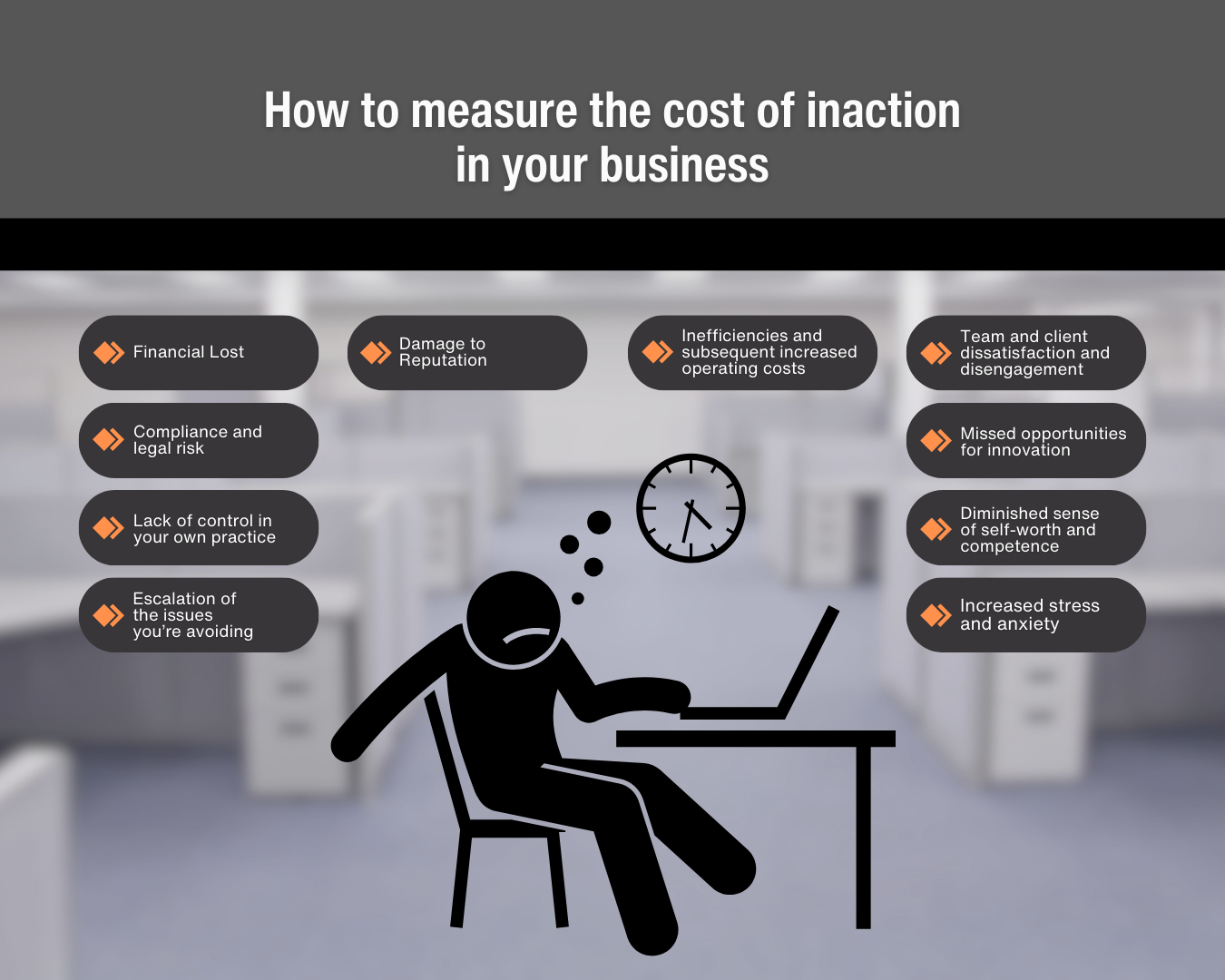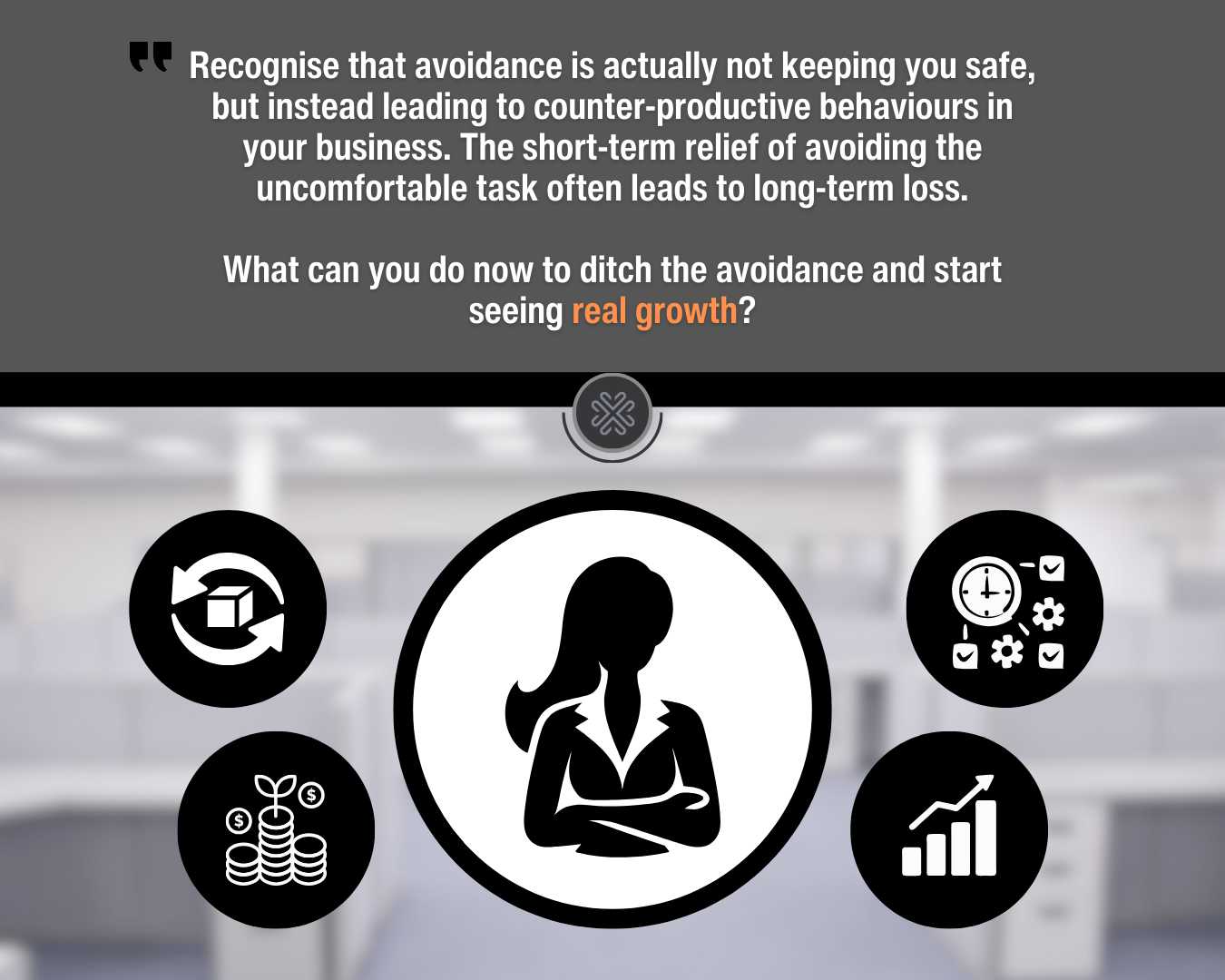How Much Is Avoidance Really Costing You? (What’s The Cost Of Inaction In Your Business?)
I’m going to hazard a guess that there’s something in your business that you don’t enjoy doing. Maybe it’s making sales calls. Maybe it’s creating social media content. Or maybe it’s just writing your newsletter.
Whatever that thing is, you might dislike it so much that you avoid doing it altogether. Possibly, to the detriment of your practice. Many of us have something that we procrastinate on in our business. But the crazy thing is, it’s often the one thing that could bring big rewards.
After all, as Keith Abraham, multi-award-winning Hall of Fame speaker and best-selling author says, ‘The rewards are in the work you're avoiding.’
So what are you avoiding in your business? And how much is this inaction truly costing you?
Case study: Anne’s avoidance
I recently met with a client, Anne.
Anne has been in her business for a few years, and has been working hard. She was creating IP. She completed courses and certifications. She even spent a great deal of time volunteering. She was well liked by her clients because she’s intelligent, engaging and a wonderful implementer. But the clients and money hadn’t been flowing in like she’d hoped.
Her husband has been seeing all of these outgoings in her business, but not much income in return. So Anne was starting to feel the pressure at home, as well as within herself. So ultimately she decided that she needed to find a part-time job on the side.
After she’d accepted the role, someone approached her and told her they could get her on a bunch of podcast interviews for the cost of US$1000/month. She came to me to ask my advice on whether or not she should take them up on the offer.
Well we had a chat, and I began to understand where Anne’s business had taken a turn. She was great at her work, and hugely valuable to her clients. But when it came to business development (BD) and making sales calls, she seemed to be a master at avoidance. This new opportunity was just another example of that avoidance. She had just taken up this part-time job because she couldn’t get a sustainable practice going, and now she was considering spending a huge amount of money to get interviewed. But this wasn’t the work that would have impacted on her practice overall.
So I told her, do the volunteering later when you have the time. Do all the courses you like once you have regular client delivery. And pay for the interviews when you have the cash flow. But do not use them to avoid working on your business. Because in the end that could cost you your business. And Anne’s inaction was at risk of costing her business.
As I saw it, she had two options. To either accept that if she dislikes BD that much, then maybe running a practice wasn’t for her. And that’s OK. Her other option was to dig in and do the work. To put as much effort into these uncomfortable tasks as the effort she’d put into avoiding them. She decided that it was time to get uncomfortable and do the BD she’d been avoiding. And that was the key to completely changing her practice.
How to measure the cost of inaction in your business
The true cost of inaction in your practice can be hard to measure – particularly when it comes to business development. Of course, there are the obvious things like increased stress and financial losses, but missed opportunities are harder to determine.
Let’s take a look at all of the things you might be missing out on when you avoid BD.
Financial costs – Delaying or avoiding critical business development tasks directly impacts your revenue. Every week you go without new leads or follow ups can mean thousands of dollars in missed income and push you further from profitability.
Damage to reputation – Inaction sends a message – and not a good one. When you fail to deliver on your promises, respond to opportunities or put yourself out there, clients, peers and industry peers may begin to question your reliability and professionalism.
Inefficiencies and subsequent increased operating costs – Putting off process improvements or tech or team upgrades means you waste time and money both of which eat into your productivity and profitability.
Team and client dissatisfaction and disengagement – If you avoid tough conversations, performance issues or client feedback, morale drops. Unresolved problems quietly erode trust and engagement. And it makes it a lot harder to retain great people and loyal clients.
Compliance and legal risk – BD involves understanding the changing environment in which you run your practice. If you ignore these things, you can leave your practice exposed to fines, legal action or reputational harm that’s far costlier than proactive action.
Missed opportunities for innovation – Business development gives you time to experiment, test, collaborate and innovate. Without it your practice will stagnate, and you’ll lose positioning and clients to your competitors.
Lack of control in your own practice – Avoiding strategic decisions that allow you to shape your business’ future leaves you reacting rather than acting. You lose opportunities to steer your own course.
Diminished sense of self-worth and competence – The longer you avoid the work that matters, the more your practice flounders, and the more it chips away at your confidence and self-belief,
Escalation of the issues you’re avoiding – Problems don’t usually resolve themselves. More often, they grow into bigger, costlier challenges the longer you leave them.
Increased stress and anxiety – Avoidance offers short-term relief, but adds to our long-term pressure. The nagging awareness of unfinished work, phone calls not made, systems not updated and all the looming consequences that come from those things, weighs heavily, often more than the work itself would.
This isn’t just your story, or Anne’s…
If you’re avoiding BD, like Anne did, you’re not alone. In fact, work avoidance is hugely common. People will go to incredible lengths to avoid facing tasks that trigger stress or discomfort at work. In this case, an uncomfortable conversation.
One poll, conducted by Joseph Grenny, coauthor of Crucial Conversations, found that 50% of respondents said they’d rather avoid the person completely, 37% would avoid the topic, 37% would consider a different job and 11% would quit their job, before they’d engage in a difficult conversation at work.
Benefits of tackling the uncomfortable
On the other hand, like Keith Abraham tells us, when you do tackle the things you’ve been avoiding, that's often where the opportunities are. If you can deal with what you're avoiding, growth in revenue and clients is inevitable.
You’ll also boost your reputation and trust because people who handle things candidly and respectfully – no matter how scary – are able to solve problems while preserving relationships. And embracing BD is how you become a top performer in your organisation.
How to overcome avoidance
So, how can you overcome avoidance?
1. Create accountability
Create accountability for yourself by engaging a mentor, coach, marketing expert or business advisor. Even your team can step into this role by reminding you when your own work is due and helping you schedule time for business development tasks.
2. Outsource as needed
Overcome avoidance by learning to outsource. First identify which tasks you’ve been avoiding but don’t necessarily need to do yourself. And then outsource to an expert. This might be writing, marketing, socials, admin, bookkeeping. Outsourcing these allow you to focus on other things in your business.
3. Understand that your goal is to help, not hustle
When it comes to making sales calls and other business development activities, reframe it as offering help to your clients. You aren’t trying to hustle anyone. You’re just saying, I have this solution, is it helpful? Reframing this conversation takes the awkwardness away.
4. Boost your self-belief
Many of us avoid situations where there’s uncertainty. Of course, there’s a lot of uncertainty in building a new practice, including making sales calls and pitching to leads. One study showed that people with high self-efficacy had lower levels of uncertainty avoidance. This suggests that it may be possible to overcome avoidance by boosting your own self-belief – that is the belief that you have the ability to accomplish your goals.
You might want to build your confidence through professional development programs. (My coaching sessions, strategy days and Women with Influence program aim to develop your self-confidence, connect you with a supportive community and elevate your practice.) Or simply recognise that once you get some experience with BD under your belt, your self belief will naturally grow.
5. Reframe avoidance
Avoidance is largely a mindset issue. When you reframe the idea of ‘failure’ to a pathway to growth and learning, it can help minimise the fear.
Recognise that avoidance is actually not keeping you safe, but instead leading to counter-productive behaviours in your business. The short-term relief of avoiding the uncomfortable task often leads to long-term loss.
This week I’d love you to reflect on the cost of inaction in your business. What do you avoid doing – and what can you do now to ditch the avoidance and start seeing real growth?


